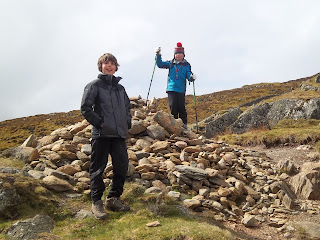A quick look at a map of the Lake District and one realises there is a need to undergo a quick course in understanding local key words, which are Norse place names left over from the Viking invasion. Otherwise we are going to get lost, seriously lost.
So here goes. Just a few words, mind you. Just to make sure that one recognises the markers on the map. I will start with the photographs below.
Jackson and Isabel are standing on a pile of rocks, half way up the slope. Not any pile of rocks, but a cairn, which is a marker to show the way, upwards in this case. Very important when the mist is down and everything looks the same.
Dry stone walls. We had to follow this wall down the slope. Keep it on your right, the instructions advised. Dry stone walls in the Lake District were built 200 to 400 years ago. This wall goes right up to the moor (a flat, often marshy, uncultivated land) at the top of this slope. We had climbed 350 metres by this stage with another 150 metres to get to the moorland. Not that we went any further, mind you. After climbing up 350 metres we had, had enough.
Fell land, in other words hill or mountain land. Made up of scree, rocks, moss, lichen, grasses. Once the land was covered in forest. That is before the stone age man cut it all down, about three or four thousand years ago. There are fell walkers and fell runners. Yes fell running is a very popular sport. Not for the faint hearted I might add. Walter and I can be classed as fell strugglers, puff, puff, puff.
A pike is a mountain peak. Probably the word 'peak' came from the word 'pike'. The picture below shows a distant view of Helvellyn Pike, which is the third highest peak in England, some 950 metres high.
A beck, which is a stream. Easy one that you might say, except if you are told to follow a certain beck. Mysterious? Yes.
I love this word. Tarn. A small mountain lake And there are lots of tarns up in the fen country. This tarn is called Red Tarn, which is on the moor under Helvellyn Pike.
Dale is a valley. Gill is a ravine. Any word ending in 'thwaite' means a clearing in the woods. And so it goes on. We could not find a glossary of terms anywhere by the way, so had to do quite a bit of research to find the meanings of the words in this blog. I am glad I found out about gills, as I did not fancy falling into a ravine, just because I misunderstood the term. Oh dear.
A view of Ullswater Lake, from our vantage point from the cairn, on the path to Helvellyn Pike. A wonderful lunch venue. In the sunshine too, then it rained, and rained, and rained.
And so on to more adventures.







No comments:
Post a Comment